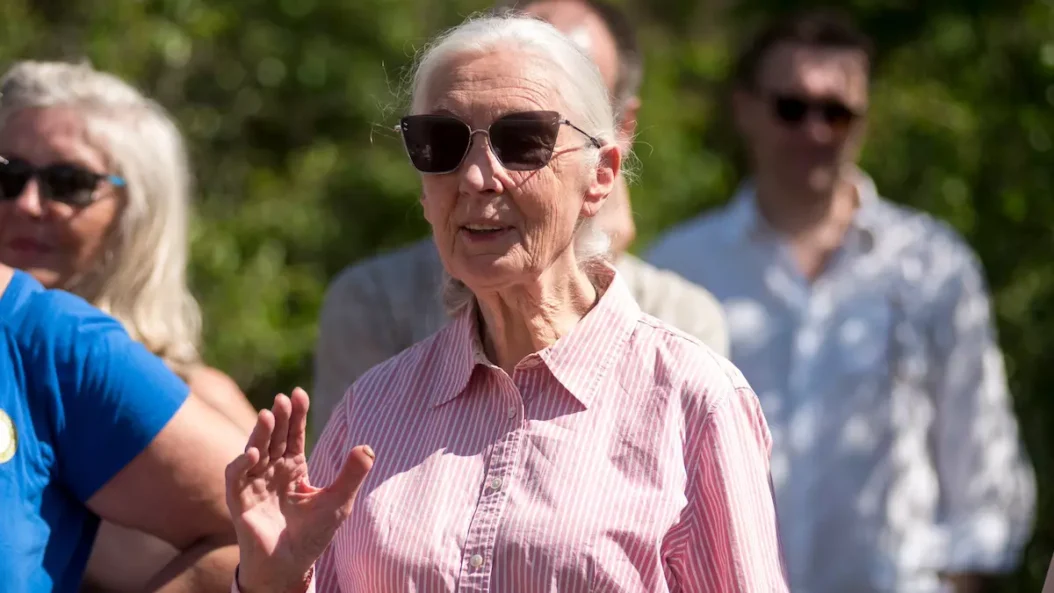Press Release


- For Immediate Release:
- Contact:
- Samantha Miller
- CATs Campaign Manager
- 970-531-6720
- Email Samantha here
- Contact:
- Julie Marshall for independent scientist interviews
- 720-255-9831
- Email Julie here
Legendary Dr. Jane Goodall Among 20 Wildlife Scientists Detailing in Public Letter That Trophy Hunting Creates Social Chaos Among Mountain Lions and Has Proven Unneeded for Management
Grand Lake, CO — “Mountain lion trophy hunting is unnecessary to manage stable mountain lion populations,” noted 20 wildlife scientists in an open letter to Colorado voters set to decide Proposition 127 in the coming weeks. That letter, released today, is led by the legendary Dr. Jane Goodall, PhD, DBE; three former top scientists with the National Park Service; and an assembly of other reputed wildlife biologists with hands-on field work with mountain lions in the West.
Interviews are available with independent scientists.

“Wild cats evolved in Colorado’s natural ecosystems and maintain stable populations based on territorialism, intraspecific aggression, prey availability, low reproductive rates and juvenile survivorship, and other key biological and ecological characteristics,” report professional working wildlife scientists in providing background as voters consider Proposition 127. Their resolute conclusion: trophy hunting is a form of trophy hunting, not management.
Dr. Jane Goodall joins a list of prominent experts in the field of mountain lion research, including Adrian Treves, PhD, of the Carnivore Coexistence Lab at the University of Wisconsin-Madison, and Dr. Rob Wielgus, former director of the Carnivore Conservation Lab of Washington State University. Dr. Wielgus did pioneering work to demonstrate that trophy hunting creates social chaos among surviving lions, with the scientists noting in their joint letter that “trophy hunting may also exacerbate humaxn-lion conflicts by removing unoffending animals from the ecosystem, leaving the door open to younger cats who are more likely to be involved in conflict random recreational killing of lions.”
“These wild cat populations can and do regulate themselves, while providing a multitude of benefits to ecosystems,” commented Dr. Elaine Leslie, PhD, former chief of biological services for the National Park Service, who concludes that “the inhumane trapping and hunting of mountain lions and bobcats is not an ethical management tool.”
The authors note that mountain lions play a critical role in controlling ungulate populations, including deer and elk, which in turn helps combat the spread of Chronic Wasting Disease — an incurable disease that has infected 42 out of 51 deer herds and 17 of 42 elk herds in the state. The always-fatal infectious disease is viewed by a wide range of observers as the more serious long-term threat to deer and elk hunting in Colorado and other Western and Midwestern states and provinces.
The scientists, in practical terms, validated the recently issued report from former USDA researcher and infectious disease specialist Dr. Jim Keen, DVM, PhD, which documents with citations to the Colorado research literature that lions preferentially remove neurologically impaired lions from populations and cleanse the populations of Chronic Wasting Disease (CWD). Dr. Keen’s work reveals that lions are a bulwark against the spread of CWD, with high rates of infection in areas without lions and low or no incidence of CWD where lions survive. “With a prohibition on trophy hunting, mountain lions can provide maximum ecosystem services, like keeping elk and deer herds healthy,” wrote the impressive list of wildlife biologists, ecologists and research scientists, who also specialize in lion science.
The signatories urge voters to consider the scientific evidence in favor of a “YES” vote for Proposition 127. The state begins mailing ballots to registered voters on Oct. 11.
“These magnificent animals are sentient beings and like us can feel happy, sad, nervous and fearful. This means they can suffer mentally as well as physically. They are not out there to be shot for trophies or to make money,” stated Dr. Jane Goodall, PhD, DBE, UN Messenger of Peace.
20 Professional Wildlife Biologists, Ecologists and Working Wildlife Research Scientists, Including Specialized Experts on Mountain Lion Science, on this letter include:
Collette Atkins, M.S., Marc Bekoff, Ph.D., Mary Foley, Ph.D., Dr. Jane Goodall, PhD, DBE, Rick Hopkins, Ph.D., David Jennings, Ph.D., Fred Koontz, Ph.D., Elaine Leslie, Ph.D., Kent Livezey, M.S., Michelle Lute, Ph. D., Delia Malone, Ph.D., Erik Molver, M.S., Carter Niemeyer, M.S., Michael Pardo, Ph.D., Joshua Rosenau, M.S., Francisco J. Santiago-Ávila, MPP/MEM, Ph.D., Michael Soukup, Ph.D., Adrian Treves, Ph.D., T. Winston Vickers, DVM, MPVM, Robert Wielgus, Ph.D.
Center for a Humane Economy is a Washington, D.C.-based 501(c)(3) whose mission is to help animals by helping forge a more humane economic order. The first organization of its kind in the animal protection movement, the Center encourages businesses to honor their social responsibilities in a culture where consumers, investors, and other key stakeholders abhor cruelty and the degradation of the environment and embrace innovation as a means of eliminating both. The Center believes helping animals helps us all. Twitter: @TheHumaneCenter
Animal Wellness Action is a Washington, D.C.-based 501(c)(4) whose mission is to help animals by promoting laws and regulations at federal, state and local levels that forbid cruelty to all animals. The group also works to enforce existing anti-cruelty and wildlife protection laws. Animal Wellness Action believes helping animals helps us all. Twitter: @AWAction_News